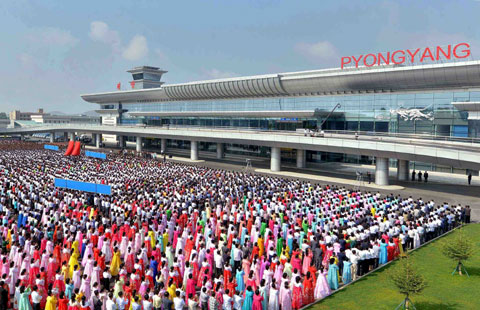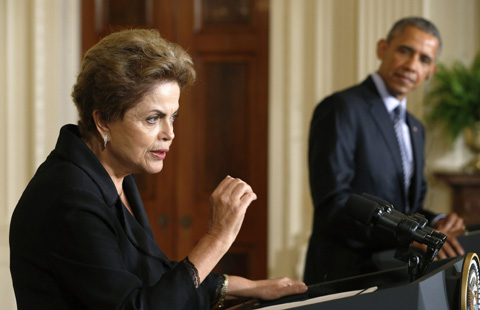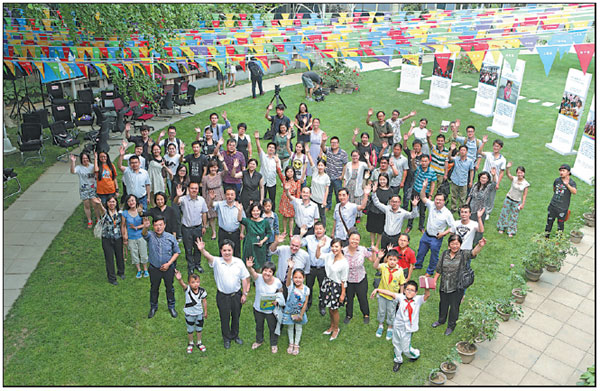Pilot creates welfare blueprint for left-behind children
Updated: 2015-07-02 07:52
By China Daily(China Daily USA)
|
|||||||||
Wang Xinrui, a 13-year-old girl from Wenlou village in Henan province, has had to live with her grandmother, because her parents, like so many other migrant workers from underdeveloped central and western regions of the country, were forced to stay away from home to earn their livings.
Statistics show there are now 60 million children like Wang, often called "left-behind children", in Chinese society. Experts say such children are more likely to be abused, drop out of school, eat unhealthily, or even suffer from addiction.
But the good news is that dealing with these serious issues faced by left-behind young people is now becoming an increasing priority for the governments, academic institutions and international organizations.
Wang was lucky, because her village is one of the 120 across the country to have its own children's center. Five years ago, she began spending her weekends with other children at the center, which was built in Wenlou as part of the China Child Welfare Pilot Program.
There are books, toys and games provided in a safe environment, ensuring that compared with many other left-behind children, Wang's childhood has largely been a happy one.
The project was created by the United Nations Children's Fund, a program headquartered in New York City that provides long-term humanitarian and developmental assistance to children and mothers in developing countries.
It launched the initiative here in cooperation with China's Ministry of Civil Affairs and the China Philanthropy Research Institute. The project is expected to be expanded to other areas of the country, as a result of its success.
Those 120 centers are spread across 12 counties, in Henan, Shanxi, Sichuan provinces and the Xinjiang Uygur autonomous region.
Organizers of the program said its priority has been to develop a nationwide child-welfare model from the knowledge gathered and lessons learned during the pilot.
One of its most important areas of work was on the training of specialist child-welfare officers and the centers are provided with financial guidance and support.
Tim Sutton, deputy representative in China for the UN fund, said this combination of funding help and training has meant many vulnerable children were given greater access to not only better public care, but also to the kind of social support that spared them much of the hardship often associated with being "left behind", such as neglect, discrimination and even violence.
According to China's latest Child Welfare Policy Report, published by the China Philanthropy Research Institute at the end of May, many more such children's welfare centers, more resources, and a much-wider professional network of child-welfare officers are still needed, to create what could truly be called a comprehensive child-welfare system.
The Chinese central government last year spent 3.5 billion yuan ($570 million) to support the building of specialist children's hospitals, and a further 2.3 billion yuan on helping some 535,000 orphans and children infected with AIDS.
Various policy documents were also published, outlining plans to improve the living conditions of vulnerable children, many of which were based on the lessons learned from the five-year pilot project.
Professor Tong Xiaojun, head of the Children's Research Institute at China Youth University of Political Studies and a member of the experts' commission behind the program, said: "We have designed and created a child-welfare model based on the work carried out within this first child welfare pilot program.
"In the future we plan to continue exerting pressure on policymakers to adopt that model as part of an overall national policy."
Tong said any future national program should certainly include an expansion of the training program now in place, which could create a more permanent network of qualified child welfare officers, who up until now have often been paid on a part-time basis.
|
Representatives from the UN Children's Fund, the Ministry of Civil Affairs and the China Philanthropy Research Institute, along with volunteers, celebrate the International Children's Day on June 1 with children from Henan and Shanxi provinces. Provided To China Daily |
(China Daily USA 07/02/2015 page16)
- Mass casualties in Indonesian military plane crash
- Japan's LDP lawmaker denounces Abe's security policies
- More than 100 feared dead in Indonesian military plane crash
- More than 50 may die in Indonesian plane crash
- Japan's Diet gets 1.65m signatures against security bills
- Thailand's first MERS case declared free of deadly virus

 Western Europe swelters in long-lasting heat wave
Western Europe swelters in long-lasting heat wave
 Top 10 shareholders of AIIB
Top 10 shareholders of AIIB
 Massive Hello Kitty theme park opens to visitors
Massive Hello Kitty theme park opens to visitors
 New terminal of Pyongyang Intl Airport put into use
New terminal of Pyongyang Intl Airport put into use
 Ten paintings to remember Xu Beihong
Ten paintings to remember Xu Beihong
 Obama hails new chapter in US-Brazil relations
Obama hails new chapter in US-Brazil relations
 Boxers top Forbes highest paid celebrities list
Boxers top Forbes highest paid celebrities list
 Not so glamorous: Glastonbury ends with sea of rubbish
Not so glamorous: Glastonbury ends with sea of rubbish
Most Viewed
Editor's Picks

|

|

|

|

|

|
Today's Top News
Economic growth driving force for China's future mobility: Think tank
'Operation duck' and the student savior from internment camp
White House lifts ban on cameras during public tours
China, Canada seek to increase agricultural trade
A Canadian comes to Xi'an, finds personal, business success
Fewer Chinese seek US grad schools
US, Cuba to announce reopening of embassies on Wednesday
China bests MDGS for improved drinking water, sanitation
US Weekly

|

|








